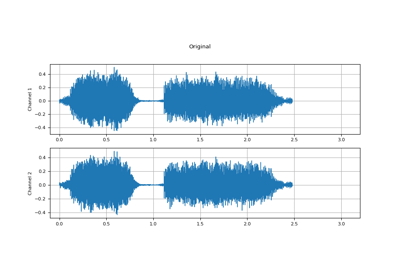torchaudio.functional.fftconvolve
- torchaudio.functional.fftconvolve(x: Tensor, y: Tensor, mode: str = 'full') Tensor[source]
Convolves inputs along their last dimension using FFT. For inputs with large last dimensions, this function is generally much faster than
convolve(). Note that, in contrast totorch.nn.functional.conv1d(), which actually applies the valid cross-correlation operator, this function applies the true convolution operator. Also note that this function can only output float tensors (int tensor inputs will be cast to float).- Parameters:
x (torch.Tensor) – First convolution operand, with shape (…, N).
y (torch.Tensor) – Second convolution operand, with shape (…, M) (leading dimensions must be broadcast-able with those of
x).mode (str, optional) –
Must be one of (“full”, “valid”, “same”).
”full”: Returns the full convolution result, with shape (…, N + M - 1). (Default)
”valid”: Returns the segment of the full convolution result corresponding to where the two inputs overlap completely, with shape (…, max(N, M) - min(N, M) + 1).
”same”: Returns the center segment of the full convolution result, with shape (…, N).
- Returns:
Result of convolving
xandy, with shape (…, L), where the leading dimensions match those ofxand L is dictated bymode.- Return type:
- Tutorials using
fftconvolve:

